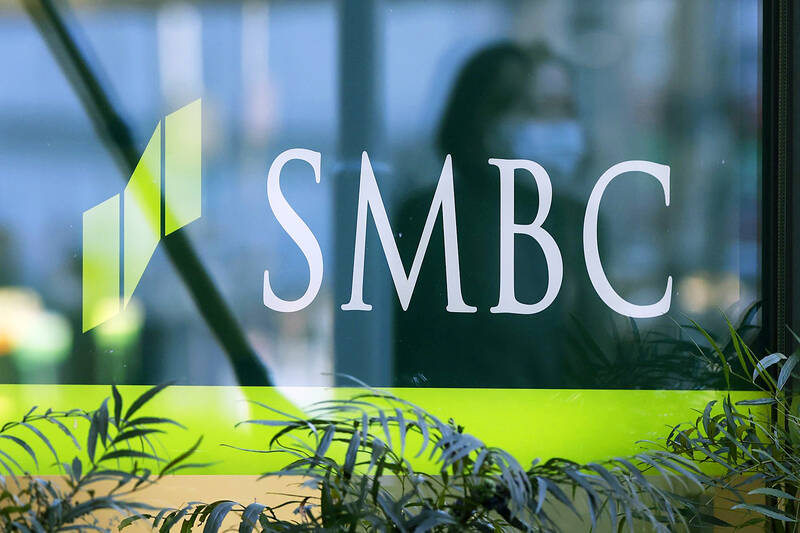Sumitomo Mitsui Banking Corp (SMBC) plans to phase out corporate and project finance exposure to coal mining by 2040, although it does not have a concrete timeline for reducing support to trade finance, a senior company official said yesterday.
The main banking arm of Sumitomo Mitsui Financial Group said in disclosures to investors last year that it would halt funding for new mines, expansion of existing ones and related infrastructure, but stopped short of providing a timeline to end corporate finance for companies linked to coal mining.
The bank would have no project or corporate finance exposure to coal mining and coal-fired power plants by 2040, SMBC managing executive officer and cohead of Asia-Pacific division Rajeev Kannan said

Photo: Bloomberg
Critics have previously pointed to the ambiguity on corporate financing potentially providing a loophole to banks lending to pure-play coal miners.
However, “some level of trade finance” could still be available for coal dealers shipping critical fuel supplies for power plants, Kannan said in an interview with Reuters.
“But even that kind of support, over a period of time, will go away,” he said.
Environmental advocates are increasingly pushing Japanese megabanks away from investing in or financing fossil fuels such as coal, which still has strong support in Japan. All the country’s banks have committed to stop lending to new coal-fired power plants.
Japan’s second-largest bank by assets was getting most of its new energy funding opportunities in the renewable energy sector, followed by hydrogen, Kannan said, adding that the group would progressively reduce exposure to gas-related transactions.
Kannan said decisions on offering financial support to carbon capture were “not easy” as it would still mean developing a coal-based utility, but called ammonia cofiring a “good option” provided that power generated from coal was quickly displaced by ammonia.
“Big picture, we are focused on our finance emissions targets,” he said. “We’ll have to see how does the portfolio reduce the total quantum of finance emissions over a period of time.”

South Korea’s equity benchmark yesterday crossed a new milestone just a month after surpassing the once-unthinkable 5,000 mark as surging global memory demand powers the country’s biggest chipmakers. The KOSPI advanced as much as 2.6 percent to a record 6,123, with Samsung Electronics Co and SK Hynix Inc each gaining more than 2 percent. With the benchmark now up 45 percent this year, South Korea’s stock market capitalization has also moved past France’s, following last month’s overtaking of Germany’s. Long overlooked by foreign funds, despite being undervalued, South Korean stocks have now emerged as clear winners in the global market. The so-called “artificial intelligence

NEW IDENTITY: Known for its software, India has expanded into hardware, with its semiconductor industry growing from US$38bn in 2023 to US$45bn to US$50bn India on Saturday inaugurated its first semiconductor assembly and test facility, a milestone in the government’s push to reduce dependence on foreign chipmakers and stake a claim in a sector dominated by China. Indian Prime Minister Narendra Modi opened US firm Micron Technology Inc’s semiconductor assembly, test and packaging unit in his home state of Gujarat, hailing the “dawn of a new era” for India’s technology ambitions. “When young Indians look back in the future, they will see this decade as the turning point in our tech future,” Modi told the event, which was broadcast on his YouTube channel. The plant would convert

‘SEISMIC SHIFT’: The researcher forecast there would be about 1.1 billion mobile shipments this year, down from 1.26 billion the prior year and erasing years of gains The global smartphone market is expected to contract 12.9 percent this year due to the unprecedented memorychip shortage, marking “a crisis like no other,” researcher International Data Corp (IDC) said. The new forecast, a dramatic revision down from earlier estimates, gives the latest accounting of the ongoing memory crunch that is affecting every corner of the electronics industry. The demand for advanced memory to power artificial intelligence (AI) tasks has drained global supply until well into next year and jeopardizes the business model of many smartphone makers. IDC forecast about 1.1 billion mobile shipments this year, down from 1.26 billion the prior

People stand in a Pokemon store in Tokyo on Thursday. One of the world highest-grossing franchises is celebrated its 30th anniversary yesterday.